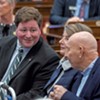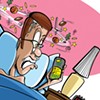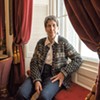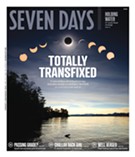Published November 5, 2003 at 5:00 a.m.
We got a Siberian Husky puppy a little while back, and although the animal's only 12 weeks old at this point, she's seen some strange people come through our door. Strange is normal, in my business. Usually, however, those strange people are on Our Side, politically speaking. But tonight is different. Tonight a black helicopter, fat and dark as a turkey vulture, has touched down in the backyard, clearly full of people from the Other Side. The husky is puzzled, her little black-and-white mask pressed against the sliding glass door, trying vainly to smell the two men approaching in the dark. One walks with the slightly off-kilter gait of a paralytic bear; the other wears glasses with squared-off Rotary Club lenses.
It's Cheney and Rumsfeld. They're making no effort to disguise themselves. I reach down and take the puppy's collar, pulling her nose from the glass.
"Don't you fret," I murmur to her, "you'll smell them soon enough."
In our refrigerator, in one of those little white bins in the door, is a metal tube of processed spread, something called räkost, which in Swedish literally means shrimp-cheese. The little bin in the refrigerator door has slowly become its own ethnic enclave over the years -- that's where the räkost tube rubs up against the tubes of fish eggs and messmör, a strange, paste-like mixture that's part butter and part vanilla and part something else my mother-in-law says can't be rendered in English.
"I'm feeling a little peckish," Rumsfeld says, giving the full-face squint that passes for a smile with him... He holds up the tube of räkost. "Mind if I sample some of these imports?"
I tell him to knock himself out, and he bustles over to the counter, snags some bread from the breadbasket, starts hunting for a knife.
Cheney's sitting at the kitchen table nursing the microbrew I offered him out of some misplaced courtesy reflex. When he's sitting, you get the full impact of Cheney's face, which is big and round and authoritative, with a built-in curl of the lip that says, I became Vice-President after two heart attacks and two drunken-driving convictions -- any questions? "It'll be a very quick visit," Cheney is saying. "The President has some intelligence he'd like to share with you."
I'm about to ask if the President really has enough to go around, when I glance over and see that Rumsfeld isn't eating the piece of bread he's smeared with all the various Swedish spreads. Instead he's passing his big Rolex over the sandwich, slowly, over and back again, eyes fixed on the face of the watch. But before I can ask what he's doing, he catches me looking and squint-smiles again. "Turns out there's no time for a sandwich, wouldn't you know. I'll just pop this stuff back in your fridge."
That's weird, but what's weirder is that while Rumsfeld's packing the stuff back into the refrigerator and cleaning the crumbs carefully off the counter with a sponge, Cheney is watching him. He's watching Rumsfeld with a look that's both casual and doting, the look of a man who has at very long last found something like a soulmate.
*****
The last time I was in the Oval Office, a Democrat was pouring me coffee and offering me some sticky buns. Now it's low-fat bran muffins and the Republican-to-end-all-Republicans: George W. Bush. I've been in the office for about 10 minutes, but it's long enough to see that everything I thought I knew about the man is wrong.
I've always taken it as an article of faith that the mind of this Bush was something like Baghdad after 8 p.m.: low-wattage, dimly lit, sporadically chaotic. But I was wrong, as wrong as it's possible to be. You can immediately sense the powerful hum of his intelligence, the surging of it somewhere back behind the carefully engineered frat-boy grin. Like a nuclear power plant, you get the distinct sense that two thirds of George Bush's mental infrastructure is dedicated simply to cooling down the white-hot core. Nothing is as it seems; it's all wheels within wheels.
"Cream, Phil?" he asks now, and I nod. He pours too much in my cup, the way they drink their coffee in Crawford, and then settles back in his comfy chair. "You married a Swede, didn't you, Phil," he asks blandly, and then quickly raises a hand. "'Course you did, you fell in love with a good woman, like all of us. You didn't ask where she was from. You said, for better or for worse, Sweden or no Sweden."
Cheney leans over, head tucked down into his burly chest. Both Cheney and Rumsfeld exhibit constant signs of submission in Bush's presence, something else I've always had backwards. "Phil, the President's saying that none of us holds your connections to Sweden against you. We understand love as much as the next guys."
Rumsfeld squints at me. "It's a many-splendored thing, Phil. We know that."
Bush doesn't even need to clear his throat; the two older men sense his displeasure that they've joined the conversation, and they fade back into the sofa.
"Thing is, Phil," Bush continues, "we've been getting some alarming intelligence out of Stockholm. Some of it's single-sourced, credible but isolated. But in other areas we've got real bedrock." He fixes me with the serious look, the one he uses in a speech just before he mentions 9/11. "And it's some scary bedrock. Scary as all hell."
Bush taps a console on his comfy chair, and a projection screen descends from the ceiling across the room. Suddenly a face appears on the screen, an intelligent face -- bushy eyebrows, thick black glasses. It's Hans Blix, the head of the UN weapons-inspection team just ahead of the attack on Iraq. "I'm sure you know this fella, Phil. Hans Blix. He's a Swede. Kept us on tenterhooks for weeks, waiting for him to admit there were some nasty weapons over there in Iraq. Never did. Left us out there twisting."
Another slide takes over the screen. A similar face -- intelligent, white hair, black glasses. "This one here is Rolf Ekeus. Headed up UNSCOM from '91 to '97. Also didn't find any weapons to speak of, also strung America along. Also a Swede." Bush turns to me, leans forward in his chair. "Picking up a pattern here, Phil?"
I tell him that two of anything is one less than a pattern, and he gives a weary nod, as though he's endlessly surprised by the ability of others to deny the truths he's found. Suddenly the screen is showing what looks like a live video feed from a laboratory somewhere. Men in clunky hazardous-environment gear are handling a small vial of something gray and chunky.
"Ever hear of Surströmming, Phil?" Bush asks, and then he answers his own question. "In Swedish, surströmming means -- "
"Sour herring," I put in. "What's your point?"
Cheney and Rumsfeld both come forward in their seats. They don't like my tone, and Bush doesn't seem to like it much, either. But he keeps himself in check. "Sur-strömming is a traditional Swedish dish," Bush continues. "Invented by fisherman. They'd let the herring rot, kinda pickle it. Smells like a barn in August, let me tell you. The CIA has reports that standard surströmming can clear out an entire apartment building. Now look, we know you don't use the stuff in your own home -- Don ran a check earlier on your refrigerator. But see this video here?"
We both look back up at the scientists handling the flask.
"That's a CIA counter-terrorism facility, and that bottle you see there's got a new strain of surströmming in it, something the government over there's been developing covertly over the last six years. Super-strömming. And the smell of this stuff makes normal rotten herring smell like Chanel No. 5, believe me."
Bush nods to Cheney, and the Vice President takes over. "Sweden's Social Democrats have a long-term disruption of American hegemony in mind. They begin with arms experts. Then, at odd intervals, they put out coded pop music, to bring Swedish sleeper cells in the U.S. online. ABBA, Ace of Bass, the Cardigans. We finally realized that groups like those don't succeed without help. A lot of help."
Now Rumsfeld can't resist, and he drops the informational bomb. "What we're saying, Phil, is that the Swedes have developed weapons of mass disruption, and they can use them against us, in our own markets and shopping malls, whenever they choose."
My eyebrows go up at the word disruption, and Rumsfeld waves away my confusion. "Look, terrorists seek disruption. Destruction is only one way of accomplishing that. Say people are in a mall heading for Roli Boli or Taco Bell, and then the stench of rotten herring sends them out to their cars instead. Multiply that by millions of individuals. The economy takes a staggering hit from something like that."
By unspoken agreement, Bush takes over and makes the emotional pitch. He's an irresistible deal-closer. "Just imagine, Phil. You and your loved ones are at that mall right by your house, what's it called, Burlington Town Center? Now imagine you've picked up some napkin rings or something at Williams-Sonoma, and you're sittin' in the Food Court. You and your family all together there, life is good. And then a man in the corner opens a duffle bag, and unscrews a cap on a jar." He pauses for effect, glances up at the vial on the screen. "That stuff could stink up the place pretty bad. Ruin a day of shopping. Maybe you can't even wear those same clothes again. Ever."
They're looking at me, all three of them leaning out toward me, faces now close to my face: Bush's stern but searching, Cheney inscrutable and pugnacious, Rumsfeld pugnacious and inscrutable. Slowly Bush puts his hand out flat in the air, palm down. "We're going into Stockholm by next August, Phil. We're gonna shut down the herring factories, topple the Social Democrats, eventually get a free-market government going over there. Are you with us?"
One by one, Cheney and Rumsfeld place their hands over the President's hand. I look back at the screen, the vial of gray chunks. The logic of all of this is so solid, so impenetrable. And of course, in the New Sweden, an American with connections and some facility in Swedish could go a long, long way. Maybe even Viceroy.
I bring my hand down on Rumsfeld's with a solid clap, and the energy of this strange new quartet fills the room. "Big time," I tell them.
Dissent: The New Patriotism
The candidacy of Howard Dean is big news in Vermont. Anti-Bush activism is a regular part of the landscape. Here, it's easy to lose track of how the rest of the country feels about the direction in which Dubya is steering the ship of state.
The polls suggest a change of course. Two years ago, at the start of the U.S. military operations in Afghanistan, a whopping 90 percent of all Americans surveyed in a Washington Post-ABC News poll approved of the Prez's performance. By November 2002, that number had dropped to 68 percent. This week, with American deaths in Iraq continuing to mount and employment at home still down, Bush's approval rating is at 56 percent and the electorate is evenly split in a hypothetical match-up between Bush and a generic Democrat.
One year from now, those hypothetical numbers will have been translated into actual votes and we'll have a newly elected president - barring any voting-machine screw-ups or last-minute Supreme Court decisions. How it all shakes out next November will depend on lots of factors, many of them beyond the control of activists and politicians, and impossible to predict today. But it will also be the result of the many ways in which the administration's policies are being countered and citizens are being primed to think for themselves and make their voices heard.
As we begin the 12-month countdown to Election Day, Seven Days looks at dissent from several angles:
>> Pamela Polston punches out the president and finds signs of hope among the opposition.
>> Cathy Resmer asks what it takes to get 18- to 25-year olds to exercise their right to vote.
>> Ken Picard looks at military recruitment - and anti-recruitment - in the schools.
More By This Author
Speaking of...
-

The Distant Snowy Mountain: a Short Story
Dec 20, 2023 -

'Solstice': A Short Story
Dec 21, 2022 -

The VCFA Master's for Children's Writing Has Become a Powerhouse
Sep 5, 2018 -

Hyperesthesia: A Short Story
Dec 20, 2017 -

Saturday Morning Babka: A Short Story
Dec 21, 2016 - More »
Comments
Comments are closed.
From 2014-2020, Seven Days allowed readers to comment on all stories posted on our website. While we've appreciated the suggestions and insights, right now Seven Days is prioritizing our core mission — producing high-quality, responsible local journalism — over moderating online debates between readers.
To criticize, correct or praise our reporting, please send us a letter to the editor or send us a tip. We’ll check it out and report the results.
Online comments may return when we have better tech tools for managing them. Thanks for reading.








































